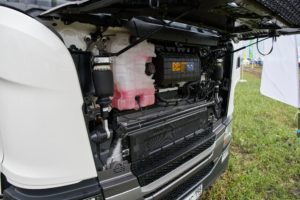Fleet operators run hectic schedules with very little room for manoeuvre to meet their customers’ high demands and ensure the company’s efficiency. On top of this, they face everyday challenges in keeping the business running, and one of these is the regular maintenance and upkeep of their fleet. Unexpected downtime in the fleet is the last thing they need and can be very costly. Maintaining the fleet correctly and choosing the right lubricants and fluids are very important to this maintenance.
One of the main reasons for downtime in any vehicle can be due to the cooling system, and this can be due to
- The system not being topped up when needed
- Topping up with just water instead of a coolant
- Not changing coolants at the correct intervals
- Using the wrong coolant
Why is Coolant/Antifreeze so important?
Coolant/antifreeze is just as important a fluid for a truck as its engine oil. It protects the cooling system and ensures smooth running. The cooling system is vital to protect because it ensures the engine does not overheat from the weather or the heat released from the engine, and protects it from freezing & cracking in freezing temperatures. It keeps the engine running at an optimal temperature for efficient operation.
Coolant also plays another vital role in your cooling systems. As water is still the best liquid for heat transfer, it forms a large part of coolant/antifreeze, and as such, there is an increased risk of corrosion to the cooling system parts. Indeed, where water is used, or lower quality coolant mixes with increased water is used, then this corrosion of the cooling system parts, which leads to breakdowns, is increased further. A good quality coolant will include the correct mix of water, MEG/MPG and an Inhibitor package. The water helps to transfer the heat away, the MEG/MPG helps to control the temperature, and the Inhibitors will protect against this corrosion, thus preventing breakages to the cooling system.
Importance of Choosing the Right Coolant/Antifreeze – Do Not Rely on Colour Alone
The market is full of various types and mixes of coolants & antifreeze with various specifications and abilities. Some offer such long life that they last longer than the truck themselves, and some indeed offer one product for all requirements and all these before we even look at the mirage of various colours used by each company to identify their specific products. It is imperative to be aware that different coolant manufacturers use different colours across their ranges, and as such relying solely on colour when choosing your top-up or replacement coolant can be very risky.
Whilst the use of Water and MEG/MPG has remained constrained through the years, the types of inhibitor packages used have grown as vehicles, and their cooling systems have advanced, requiring different performance levels. This inhibitor package is only a small part of the coolant, but it has the strongest influence on the coolant quality. Only a few years ago, there were three main different types of inhibitor packages, whereas today, there 6 main packages used across the various coolants/antifreezes on the market with a wide variety of colours used to identify them.
- IAT (Inorganic Additive Technology (mineral)) – Silicates – Green or Blue
- OAT (Organic Acid Technology) – Organic Acids – Orange, Red or Yellow
- HOAT (Hybrid OAT, Phosphate-free) – NAP-free – Turquoise
- HOAT (Hybrid OAT) – Silicates and organic acids – Yellow
- Si-OAT (Silicated HOAT) – Silicates and organic acids – Purple or Pink
- P-HOAT (Phosphated HOAT) – Phosphates and organic acids – Blue or Pink
As you can see from this list, there is some crossover in the colours used between various coolant kinds, and this list is merely an illustration of the most popular colours. Since many coolants are incompatible with one another, selecting the incorrect coolant or mixing different coolant types can have expensive repercussions. Mixing coolant types with different additives can dilute or affect the additive properties, thus lessening the impact and protection given or indeed cause a reaction to create a mixture which will block up the system.
Make The Right Choice
For those unsure of the correct product type to use here are some points to keep in mind:
- Refer to the vehicle’s manual to see which type of coolant/antifreeze should be used to ensure you stay within the vehicle’s warranty.
- All too often, people can be persuaded by price, especially cheaper universal products claiming to meet all vehicle requirements. This is no longer possible as specific manufacturers have specific requirements and formulations for their cooling systems. Hence the need for six different types on the market.
- Check the colour and look for similar colours but remember that colour should only be used as a guide, and you need to check the exact type of coolant on the label to ensure it matches what your manual indicates is the correct type.
- If unsure, always consult a trusted stockist/supplier for the correct guidance on which type, you require and the best brand to look for.
One such trusted supplier in the Irish market is Finol Oils. We have been advising & supplying customers with Coolants & Antifreeze for over 48 years, and ensure customers are using the right products. We offer a full range of TotalEnergies Coolelf/Glacelf and our own CoolTemp Range. We will have a product for each of the different manufacturer requirements on the market, and will have the right product you need.
